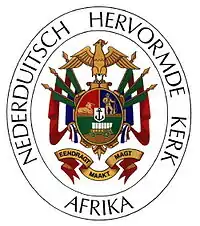Dutch Reformed Church in South Africa (NHK)
The Dutch Reformed Church in Africa (Dutch: Nederduitsch Hervormde Kerk van Afrika, abbreviated NHK) is a Reformed Christian denomination based in South Africa. It also has congregations in Namibia, Botswana, Zambia and Zimbabwe. Along with the Dutch Reformed Church in South Africa (NGK) and the Reformed Churches in South Africa, the NHK is one of the three Dutch Reformed sister churches of South Africa.
| Dutch Reformed Church in Africa | |
|---|---|
 | |
| Classification | Protestant |
| Theology | Reformed |
| Polity | Presbyterian |
| Branched from | Dutch Reformed Church |
| Separations | Reformed Churches in South Africa (1859) |
| Congregations | c. 300 |
| Members | 130,000 |
Unlike the NGK, which uses the simplified spelling Nederduits used in both Afrikaans and Dutch, the NHK retains the old spelling Nederduitsch, the word originally referring to the Dutch language.[1]
History
The Dutch Reformed Church was introduced to South Africa by the Dutch East India Company's settlement at Cape Town in 1652. The first formal congregation was established in 1665 under the jurisdiction of the classis (presbytery) of Amsterdam. Despite the permanent takeover of the Cape Colony by the UK in 1806, the church remained semi-established with congregations supported from government funds.
In 1824 an autonomous synod was established at the Cape, removing the church from control from the Netherlands. This autonomous synod would become the NGK. The unwillingness of Dutch ministers to serve in a British-controlled colony meant that Scottish Presbyterian ministers with British sympathies were introduced to the church.[2]
In the Great Trek of the 1830s and 1840s, Boers left the Cape Colony and established republics in the interior of South Africa. The NGK, with its connections to the colonial government, did not minister to them. The South African Republic (ZAR) was established in 1852, and in 1853 Dirk van der Hoff arrived from the Netherlands as the first minister of the newly established NHK, which became the state church of the ZAR in 1860.
In 1858, meanwhile, some members known as "Doppers" broke away from the NHK over the question of hymn-singing and formed the Reformed Churches in South Africa. The NGK also subsequently established congregations within the Transvaal. In 1885, the NGK and the NHK were united into a single church, but some NHK members and congregations rejected the union; it is from these members that the current NHK descends.[2]
The Church supported apartheid[3][4] and in 1982 was expelled from the World Alliance of Reformed Churches which declared apartheid to be a sin.[5]
Doctrine
The church recognises the Apostles Creed, Athanasian Creed, Nicene Creed, Heidelberg Catechism,[6] Canons of Dort[7] and the Belgic Confession.[8]
The Dutch Reformed Church adheres to the 5 Solas:
- Sola Scriptura - Scripture Alone
- Sola Gratia - Grace Alone
- Sola Fide - Faith Alone
- Solus Christus - Christ Alone
- Soli Deo Gloria - the Glory of God Alone[9]
Statistics
It has 130,000 members and about 300 congregations, 38 regional Synods that meet annually and a General Assembly that meets every third year. It also practices sermons in Afrikaans.[10][11]
It has a presbytery in Namibia and congregations in Botswana, Zambia and Zimbabwe.[12]
The church is a member of the World Communion of Reformed Churches.[13][14]
References
- Beknopt Nederduitsch taalkundig woordenboek, Petrus Weiland, Blusse en van Braam, 1829, page 236
- Prozesky, Martin; de Gruchy, John W., eds. (1995). Living Faiths in South Africa. Cape Town: David Philip. pp. 30–31. ISBN 9780864862532.
- "Dutch Reformed Church (DRC)". 30 March 2011.
The church supported the system of apartheid, which institutionalized separation and stratification of the people of South Africa according to race. The social segregation of Black, Coloured and White people was reflected in the establishment of churches of these three groups. In the 1980s the church was expelled from the World Alliance of Reformed Churches for its support of apartheid. In 1986 the church showed its repentance by preaching for all members of all racial groups to pray under, one umbrella, thus making South African history by welcoming Black people back in the church. In spite of the end of apartheid, racial divides still exists within the church.
- Westboro Baptist Church (5 October 2008). "South Africa's False Religious Systems". God Hates the World. Kansas: Westboro Baptist Church. Archived from the original on 5 October 2008.
DRC provided the national policies (especially apartheid) and many prominent government officials were members.
- Fasse, Christoph. "Übersicht über die weltweite reformierte Kirche". www.reformiert-online.net.
- Montgomery, Dewald. "Heidelbergse Kategismus". www.nhka.org.
- Montgomery, Dewald. "Dordtse Leerreëls". www.nhka.org.
- Montgomery, Dewald. "NGB". www.nhka.org.
- www.barecreative.com, Bare Creative -. "NG Kerk in Afrika » NGKA". www.ngka.co.za.
- Fasse, Christoph. "Address data base of Reformed churches and institutions". www.reformiert-online.net.
- "South African Christian". www.sachristian.co.za.
- Fasse, Christoph. "Address data base of Reformed churches and institutions". www.reformiert-online.net.
- Montgomery, Dewald. "WARC". www.nhka.org.
- www.wcrc.ch/node/164 Archived August 8, 2012, at the Wayback Machine
External links
- Official website of the Nederduitsch Hervormde Kerk van Afrika (Official website)
- HTS Teologiese Studies/Theological Studies is an influential and frequently cited accredited peer reviewed, Open Access journal, published since 1942, that promotes multi-church and inter-faith research in the international theology arena.